I play a lot of survival games. A lot. In fact, if you follow me on Steam, you might think that’s all I play. Because of my tendencies to hate myself and want to watch my player character die, The Flame in the Flood called to me. A survival roguelike with adorable artwork that’s meant to remind gamers of The Oregon Trail? Hell-to-the-yes.
Developed by The Molasses Flood, The Flame in the Flood follows main character Scout as she traverses a world flooded to biblical proportions. Along the way, she meets a dog named Aesop and he joins her down river in search of an emergency radio signal.
On the surface, The Flame in the Flood is a simple game. Your goal is to travel downriver with your canine companion and just…survive, by any means necessary. If that means you have to eat 30 stacks of cattails and dandelions, so be it. Hey, we didn’t say that survival tasted good. Of course such a world isn’t without perils of the aggressive nature, so expect to come across snakes, bears, and wolves on your journey. As you drift downstream at the mercy of the currents you can stop off at different islands comprised of gas stations, marinas, camp sites, and so on. It is on these islands that you collect your goods for survival, kill animals for meat and hide, and upgrade your raft and weapons. Then you push off the dock, never to see that land again, so loot while you can.
See? Simple.
And if that’s all you want from a game, to float down a never-changing river, plod through repetitive land areas, and make the same three foods over and over for hours on end, then The Flame in the Flood is for you.
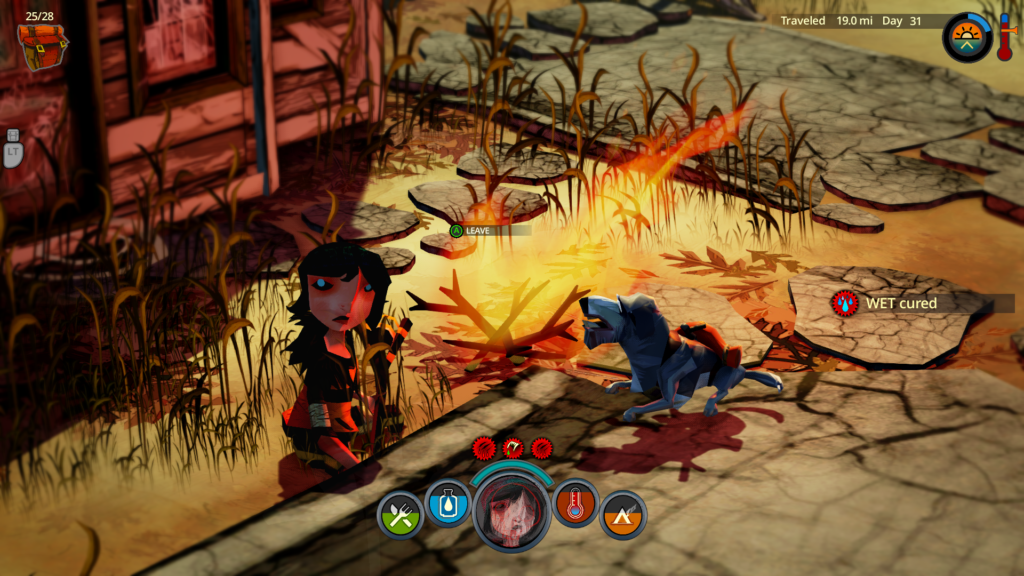
Don’t misunderstand me. I liked The Flame in the Flood. For the first hour. It was an exciting survival game–a struggle to get flint for a stone knife, difficult to collect enough saplings for snares–but once I hit the third region out of ten and realized that everything was the same as it was the first time I set sail, I grew tired of the journey. And that’s the problem with the game. Once you get the basics down, that’s it. There isn’t an “end game” to strive toward and things don’t progress in difficulty down the river. Sure, it gets a smidge colder along the way and it rains so you might catch a cold. Or you might run into a bear, but that’s it.
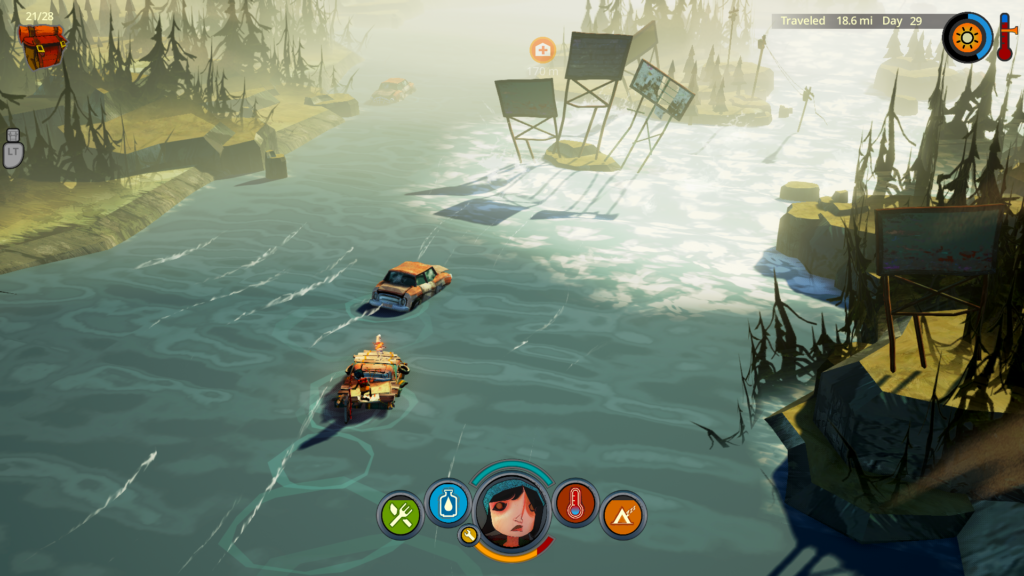
The game is labeled as a roguelike in that each time you play the river is different from the game before. This doesn’t affect modes that restart from checkpoints, however, as those stay the same, which is kind of frustrating when you’ve played the same area over and over. I did find a loophole in the game mechanics though, that made my playthrough significantly easier (to the point that it felt like cheating): whenever I was near-death, I simply closed out to the menu and restarted the game. The game would start again at the last save point (usually when I landed at a new dock or woke up from sleeping) rather than the last checkpoint (which is where I’d go if I died). Again, it felt like cheating so I didn’t abuse it, but the option is there. Because you’ll die, a lot. Either from drowning or starving or getting mauled by a bear or just due to sickness, your death will happen.
Since I am a huge fan of the survival genre, and I don’t mind chore games that require me to grind for resources, I was disappointed with how little went into the mechanics of The Flame in the Flood. Sure, I was frustrated that I could loot a used snare for partial resources but I was even more frustrated at the lack of options when it came protecting myself in the post-societal world. Using a bow was pointless and the only means to defend myself came in the form of spear traps and poisoned meat. Even a rudimentary spear would have been a welcome addition against charging boars.
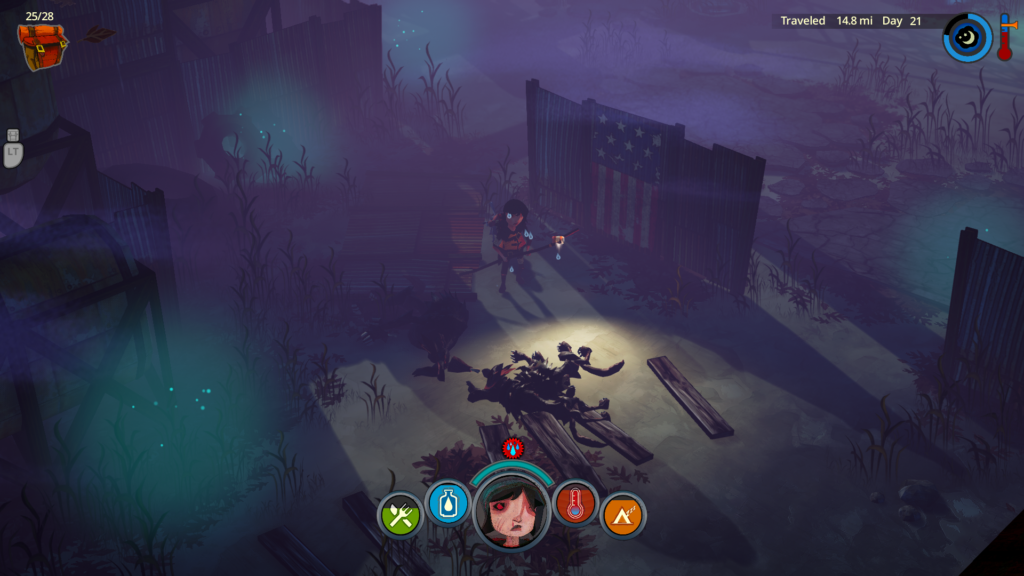
The same complaint goes for food and clothing. You can loot garlic, which I thought I’d be crafting into a more complicated meal that would offer buffs or healing. I hoarded the garlic thinking a rarer item like that would be important. Nope. It’s just garlic. You eat it plain. The clothing crafting system is okay but there was no real need to craft the top tier bear armor because it just didn’t matter. If my character got cold (traveling downstream, mind you), I simply lit a fire. Higher tiers of armor didn’t grant me better defense or a lesser chance of getting lacerations, it just kind of made me less cold.
Throughout the world there are small, random quests you can complete by visiting dropboxes and each quests offers you up a reward of some kind. While great in the early game, mid to late-game, these tasks are pointless. Why waste resources to make rabbit armor and collect a camp fire when I could just…make my own camp fire? If the quests had increased in difficulty with better rewards based on each region, I would have been excited. Instead, like most of the game, they stayed the same until the end.
Along with quests, there are random NPC interactions, solo characters who can tell you a teensy bit more about the world and offer to trade with you (or just give you free things). It would have been nice to interact with even a small civilization, a family or two living in the wilderness together, but that wasn’t the case. Instead, I met with Magnolia a few times (who said the same thing each time I met her and if I could have, I would have killed her for being a witch) and ran into some characters for the main quest. Mostly, the game was without human interaction, which is a shame.
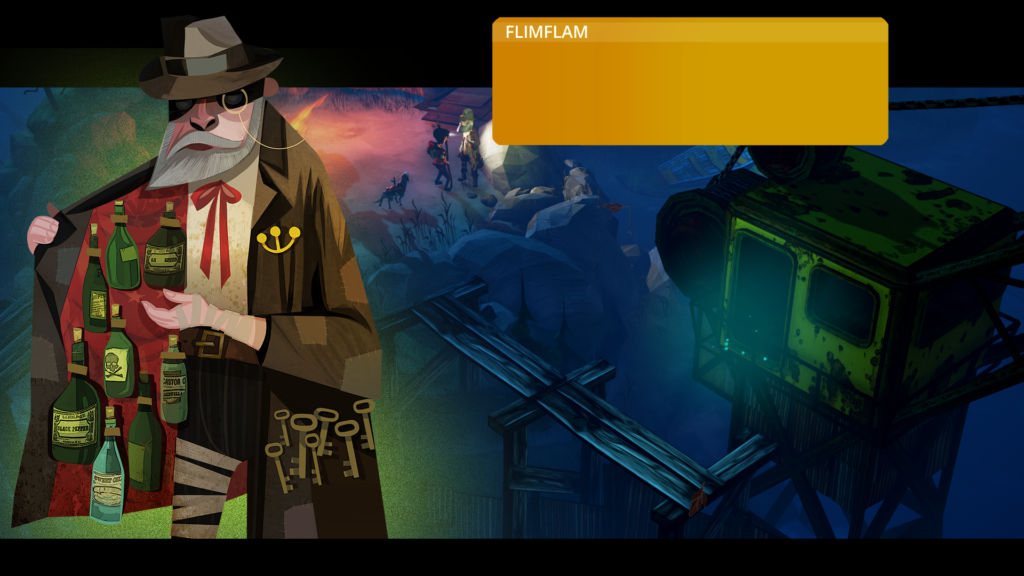
Crafting was a needed addition for the game and the menu wasn’t too complicated, even offering a quick deploy option for food and weapons at the left-hand side of the screen. The inventory, however, was another matter. It was a mess of items that didn’t stack properly, items that adhered to arbitrary stacking rules (meat stacks, jars don’t, etc.), and a complicated nuisance of shuffling items between pack, dog, and raft. Oh, and don’t spend too long in the inventory because the game doesn’t pause while you’re in there and animals WILL kill you while you’re desperately trying to make space for more nuts and bolts.
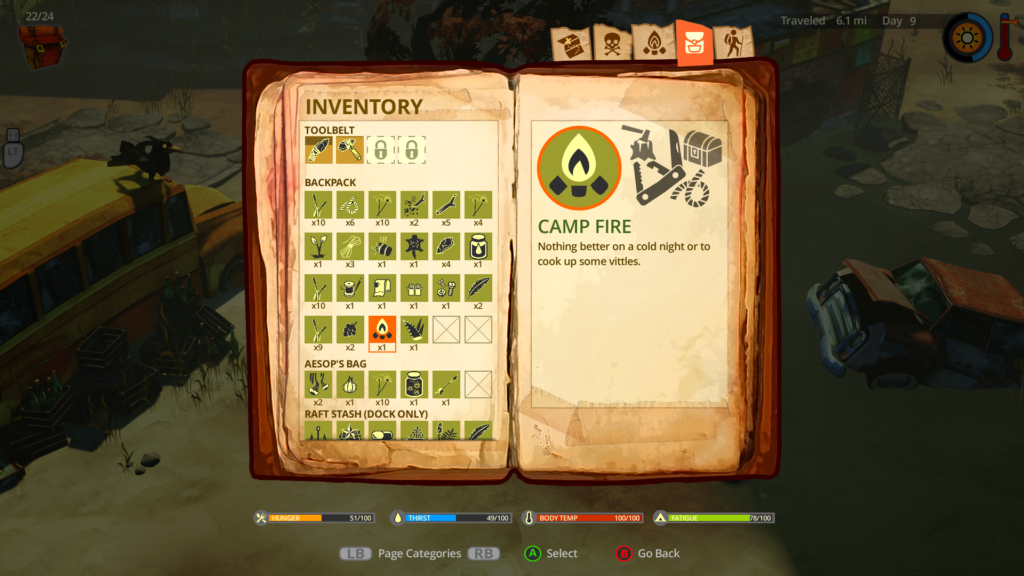
As I said before, the graphics were stunning, a perfect art style for such a game and even the music mixed nicely with the theme. The atmosphere, though repetitive, was well done and easy enough to navigate. It’s fairly linear and each map area is small so you won’t be getting lost in the woods any time soon. Again, simple. And on the Xbox One the game performed wonderfully. I didn’t have any issues with bugs or glitches.
Unfortunately, The Flame in the Flood is a game with a lot of squandered potential. It does survival and roguelike but doesn’t do either as well as I would have liked. Though on the surface it looks like a polished product, by the end it feels more like an early access game, and I say that actually liking the main story and concept behind the ending. For the first few hours it offers plenty of fun and excitement, but don’t expect to get much more out of it. I played for 8 hours and felt like I explored all I needed to, which is disappointing for a game that should be based on replayability.
Score: 5.5/10
The Flame in the Flood is available now for PC, Mac OS, and Xbox One.
A review code for this game was supplied by the developer.
